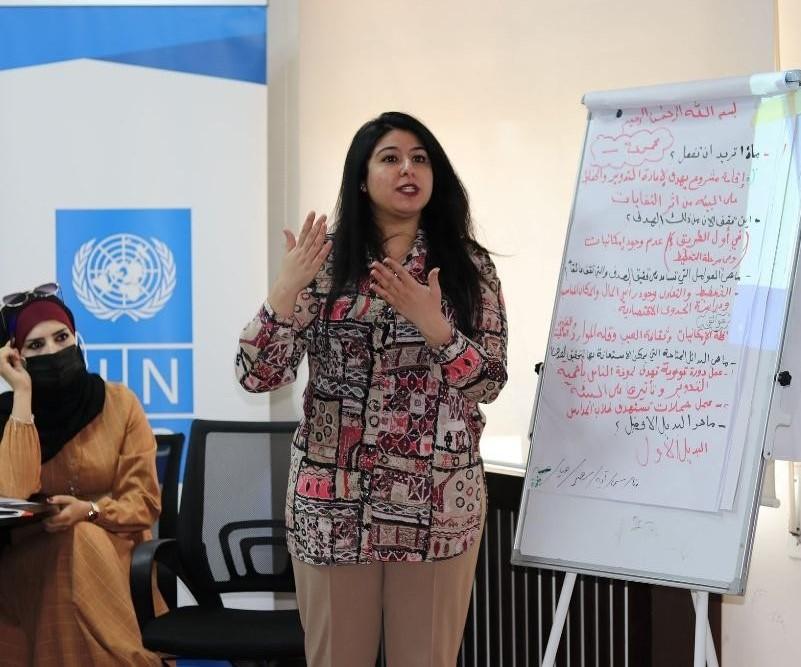SIRCLES: women empowerment in Jordan’s Green Economy towards sustainable development

This article forms part of a series of publications under SIRCLES project to support circular economy opportunities for employment and social inclusion in our partner territories Palestine, Lebanon, Spain, Tunisia, Italy, Greece, and Jordan.
Gender equality and women’s empowerment are policy agendas that support social development and poverty reduction and should be a priority in all countries. Both are essential for overall economic growth. To achieve green growth, women and men should be viewed with a sense of equity, and the poor and marginalized as not merely vulnerable, but as active agents of change for more sustainable growth.
EDAMA and Women Empowerment
EDAMA Association, which means “sustainability” in Arabic is a Jordanian NGO established in 2009 and is SIRCLES project’s partner in Jordan has been always seeking to support women by holding specialized conferences and power breakfasts to convey women’s voices and challenges. An example is the power breakfast with Women in Renewable Energy (WiRE) organised in 2019 [1], and another is launching a project of Increasing Employability of Jordanians and Syrian Refugees in Mafraq Governorate. This project aims to build women and youth capacities in the green energy sector through training in PV module cleaning. [2]
Women Employment in the Renewable Energy Sector
The renewable energy sector has a considerable potential to create new jobs for both women and men, as the 2019 International Renewable Energy Agency (IRENA) report, Renewable Energy: A Gender Perspective, demonstrates. [3]
According to the Jordan Clean Technology Sector Report prepared by EDAMA in 2016, out of the 7,928 employees working for 172 companies in this sector, 18% are women. The pie chart (figure 1) below illustrates the percentage of women employment in different employment categories within the clean energy sector. [4]

Figure 1 - Percentage of Women in Different Employment Categories within the clean energy sector.
Women Employment in Solid Waste Management Sector
Many initiatives and programs are currently working on women’s empowerment and social development in general, as well as contributing to an array of different sectors, such as the ENI CBC MED Projects (SIRCLES and MYSEA). These projects aim to build women and NEETs’ skills in the field of food waste management. A similar program is the “Enhancing Women Participation in the Solid Waste Management Sector in Jordan” which is a grant program launched by the UNDP in 2020 that aims to promote women’s participation in the solid waste management sector in Jordan.
The pictures below show 34 women taking part in a capacity building workshop organized as part of the “Enhancing Women Participation in the Solid Waste Management Sector in Jordan” project. [5]

Picture 2 - A training session within the project Enhancing Women’s Participation in the Solid Waste Management Sector in Jordan
Women’s economic empowerment and equality are the entry points of this project and the means through which the challenges preventing Jordanian women from actively participating as workers, entrepreneurs and drivers of change, are identified. They are framed with an understanding that women’s economic empowerment is realized when women and girls have equal access to knowledge as economic opportunities, decision-making power, assets and resources, that is, where and when gender-sensitive policies are implemented. Women will be empowered through improvements to the effectiveness of women’s organizations in actively representing and supporting women’s voices in the decision-making processes, increasing women’s participation in the local economy, enhancing gender informed and responsive policy making at the community and national levels. Our focus is on the solid waste management sector in particular.
The project targets women in four municipalities in Irbid Governorate: three municipalities of Northern Shouneh district (Mo’ath Bin Jabal, Tabqet Fahel & Sharhabeel Bin Hassnah) and Dair Abi Said municipality of Kourah district. [6] The assignment “Capacity building and operations of Compost and Sorting Plant at Al Kura District in Irbid” focuses on a new proposed compost plant in Al Kura District (at Rabeit Al Kura MSW Transfer Station) and the integrated sorting activities on that site. The Project’s goals will be achieved by providing capacity building workshops for 1000 beneficiaries, conducting relevant research, establishing a sustainable business model for the composting plant, sorting, and recycling facility where 50 women and men (mainly women) will be employed in the target areas.
Such projects allow women to make significant contributions to all walks of life, allowing them to go beyond the traditional gender roles. This supports the fact that women are good drivers of environmental ideas, and this bottom-up approach is vital to sustainable waste management in developing countries.
References:
[1] EDAMA Association for Energy, Water and Environment (2019). Annual Report.
[2] EDAMA Association Launches A Training Program For Youth And Women in Mafarq
[3] The International Renewable Energy Agency (IRENA) (2019). Renewable Energy: A Gender Perspective
[4] EDAMA Association for Energy, Water and Environment (2016). Jordan Clean Technology Sector Report
[6] Capacity building and operations of Compost and Sorting Plant at Al Kura District in Irbid







